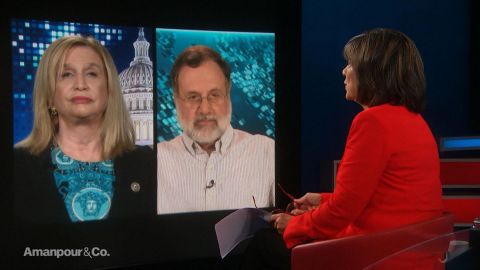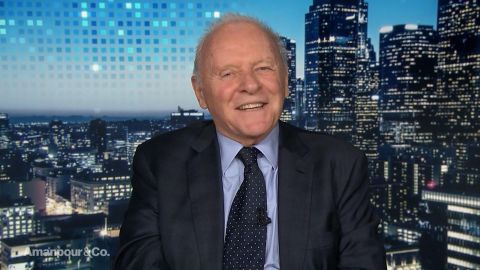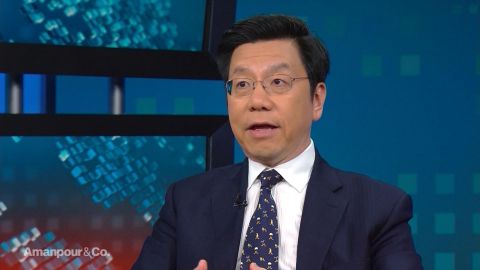Read Transcript EXPAND
HARI SREENIVASAN: You worked in artificial intelligence for a long time, you talk about AI in different phases, you’ve got the sort of Internet phase, business, you call it eyes and ears and in the hands and feet.
KAI FU LEE, AUTHOR: Right.
SREENIVASAN: Explain that evolution.
LEE: Sure , we’re already surrounded by Internet AI that is AI being used within the Amazon, Google, Facebook, in fact this is how they’ve become so valuable because they take the data that we provide and our actions and use that to maximize the revenue or user benefit or some combination as the natural first step because they have the most data. The next step will be businesses, so banks, insurance, hospitals and so on will collect data in that will have data in their domains and they can use it to make better decisions about credit card fraud detection, loan approvals, investment allocation and so on. But these are both phase I and phase II are both based on existing or being generated — big data being generated. The third phase is when the AI has eyes and ears and they can see and hear. So Amazon Go, Amazon Echo are examples of that, but that is going to be on everywhere as devices become cheaper and sensors are embedded everywhere along with the Internet of things are adding to this network capturing the physical world and doing things that couldn’t be done before such as an autonomous store without any human’s involvement. Then the last phase, the fourth phase is the autonomous AI phase where the hands and feet are added, for example, AI can decide on making loans to people, what kind of insurance policies to issue, AI can be added with computer vision and robotics and builds self driving autonomous vehicles or machines that can manufacture future products without human involvement or even autonomous agriculture, picking up fruits and vegetables and strawberries. So really taking over all the routine jobs we have.
SREENIVASAN: You just rattled off four different industries, all the loan officers in the world, all the drivers in the world, all the pickers of the crops, these are you are talking about a seismic shift here, you are talking about billions of unemployed people if all of these jobs go away.
LEE: Yes and the good news is that this would generate amazing efficiency and a phenomenal amount of the wealth that will help move us forward and the question is what happens to those unemployed people how does the redistribution of wealth and the retraining for the new jobs or early retirement or the shift to volunteerism can transition the work style so that people can continue productively and happily.
SREENIVASAN: How did our education system change to prepare for this?
LEE: So the education system has to stop guiding people towards the jobs that have no future, so even vocational schools have to rethink, are we going to have as many auto mechanics or truck drivers were not, but we might still have a large number of plumbers because AI can’t handle the variations of environments and we’re going to need more elderly care, more nursing, more teachers, so the entire our job mix will change and education should change along with it.
SREENIVASAN: In the book you lay out almost a four-quadrant matrix of the types of jobs that will be most likely to be replaced or are being replaced now and the types that are least replaceable. Explain.
LEE: So if we look at this out defensively what are the things AI cannot do, that’s what we should put our energies. AI cannot be creative and AI cannot be compassionate. Those are the two biggest core pillars, there other things but these are the two core things. So that the four-quadrant would correspond to four types of a human AI symbiosis. So for the highly creative highly compassionate jobs, AI doesn’t have a chance, best is tools to help us do better in those jobs. For the jobs that are highly creative but doesn’t require human interaction or compassion, then humans will continue to create with AI becoming tools to help them be more creative, let’s say scientists might discover more drugs. For the jobs that are highly interactive with human component, compassion and empathy all but not that creative, those are the kinds of jobs where AI analytical engines will become dominant but humans will really wrap their warmth and connectivity around it. For example, doctors, teachers, they will make the professions more effective and leverage the AI tools and be able to reach out to more people that way.
SREENIVASAN: So how does has a doctor’s job change in 20 years with let’s say in AI assistant?
LEE: I think the dock is having a doctor’s job will change into that of interacting with the patients, understanding the patient’s history, teasing out all of the necessary ingredients to make a good diagnosis, have that — make the patient feel listened to and then have rely on the AI to make the possible diagnosis and the doctor can potentially override in the beginning but over time, the AI will be so much better the doctor is going to be mainly the human communication tool to offer warmth, compassion, care, confidence, and that outcome means the type of healthcare that we’re able to get today can be provided to all the poor regions and countries at a much lower cost.
SREENIVASAN: Your book is called AI Superpowers there’s a lot of concern on the balance between who has a lead and where is the edge and do they overtake each other and who is at advantage here? You start out by saying what China is not in the league right now but were accelerating and catching up at an incredibly fast pace.
LEE: Right. US led all the technology research and that it’s actually openly published and shared so China like every other country, has an opportunity to take those some algorithms and implement them. China’s advantage is that China has a lot of entrepreneurs and a lot of capital to fund them and they work extremely hard and they are tenacious in finding every business opportunity in phases 1, 2, 3 and 4 of AI. And but most importantly, China has a lot more data than everyone else because all this a AI is automatically learning based on data, the more data you have, the better your AI is, and China has more users and also more data per user so the companies that are being built in China has an inherent advantage of having more data and therefore training better AI.
SREENIVASAN: Given that there’s so much data being generated in China on your facial recognition and on your shopping habits, where does privacy come into the mix?
LEE: There are clear laws that would forbid companies from sharing or selling the data, so actually the Facebook Cambridge Analytica case..
**
SREENIVASAN: … China on your facial recognition and on your shopping habits. Where does privacy come in to the mix?
KAI FU LEE, AUTHOR: There are clear laws that would forbid companies from sharing or selling the data, so actually the Facebook, Cambridge Analytica case would have been more seriously prosecuted and more people would be put into jail for illegally sharing private data. However, the collection by a company of where you went on your shared bicycle or what you bought on your mobile phone is not so different from what Visa and Google and Open Table have about the American consumers. It’s just that the speed of adoption is faster. I think ultimately, every country has to figure out how to balance privacy, personal safety, convenience. These things can’t all be perfectly had.
SREENIVASAN: Are you concerned about the size of companies getting too big and leading people out whether it’s Google and Facebook and Amazon here or it could be Tencent or Alibaba in China?
LEE: Yes, yes, I am. I think there is a virtuous cycle for them because more data builds better products and makes more money than more machines given more data. That virtuous cycle makes monopolies harder to break. Traditionally, monopolies were there because of exclusive access to resources, a great brand, user loyalty or technology edge or high hurdle of entry, but now the AI can add this virtuous cycle, so I think we need to be cautious about the companies that are getting too powerful. I think there’s still plenty of room for innovation and entrepreneurship in areas that they’re not currently that many.
SREENIVASAN: It used to be the picture was two guys in a garage coming and putting a better mousetrap, writing something better, and two young women in a dorm room builds something that challenges Alibaba or Amazon.
LEE: I don’t think so. I think they can invent a brand new application and that will over time come into competition and challenge, sort of like how Facebook became kind of a threat to Google at times. Kind of how actually in China by Duos, the big company and then Tencent and Alibaba emerged. So, I think new companies can challenge old ones but probably and generally not indirectly going into a market in which a nearly monopolistic position is already there.
SREENIVASAN: I want to ask you this question as both somebody who understands both of these cultures growing up in Tennessee working in China being Chinese and also as an investor. The last six months to a year have been a low point in the relationship between the United States and China. We’re right now engaged in a trade war. How do you see this playing out?
LEE: Well, I think US and China have such mutual dependencies in technology that a continued trade war would just be a lose-lose and I also – it’s a very sad for me because I think there’s huge affinity by the Chinese people for America. As China opened up, it looked to the market economy in the US. It looked to Bill Gates as their heroes, and actually, if you go back further historically, there is the American Flying Tigers in World War II. There’s Americans donating Tsinghua University, the best school in China. So all of that goodwill I think seems to be melting away from the US side. And I think that would be such a pity and all of us, my colleagues, who have benefited from the great American education, so there is every reason for US and China to work together because of the already intermingled technology situation and for such strong affinity coming from China towards US and whatever the governments want to argue and fight over, I sure hope the American people understand there are 1.3 billion people who love to be America’s friends.
SREENIVASAN: You said that it took a horrible stage 4 cancer diagnosis for you to learn to slow down and you’re actually evangelizing in a way for other companies in China to create a different kind of work culture?
LEE: I am trying to do that, I don’t expect to be completely successful. I think the forces of the generations of poverty and the hunger for success is too much to and too insurmountable. But I do see in my personal case, I was working as hard as the entrepreneurs that my company funded and only when I got sick did I realize that all the money and things cannot buy back my health or the love of my family. So I came to a realization by facing death and I wanted to share that experience with those people who will listen.
SREENIVASAN: The book is called ” AI Superpowers: China, Silicon Valley, and the New World Order.” Kai Fu Lee, thanks for joining us.
LEE: Thank you, Hari.
About This Episode EXPAND
Christiane Amanpour interviews David Kaplan, author of “The Most Dangerous Branch” & Carolyn Maloney, U.S. House Democrat; and Anthony Hopkins actor in “King Lear.” Hari Sreenivasan interviews Kai-Fu Lee, author of “AI Super-Powers.”
LEARN MORE


